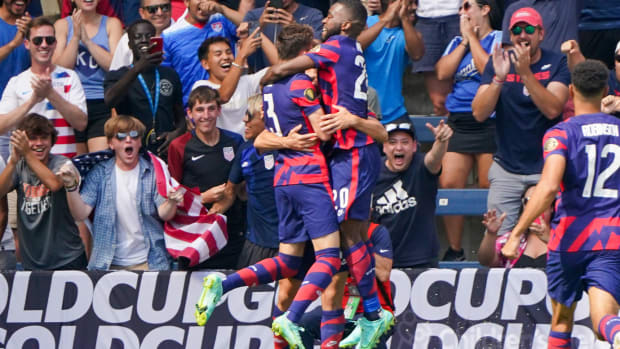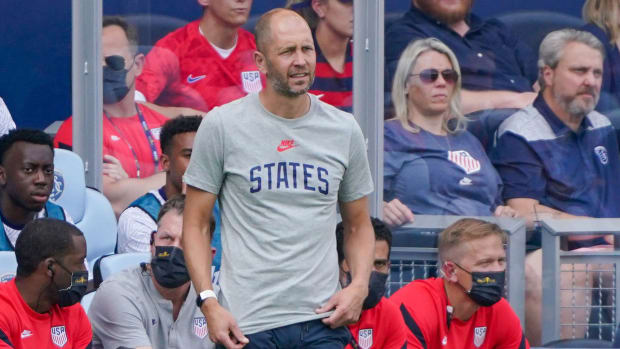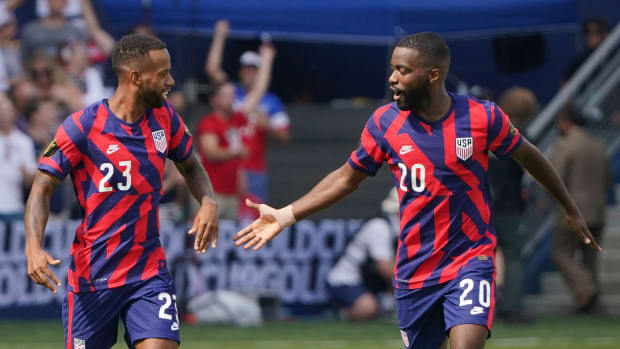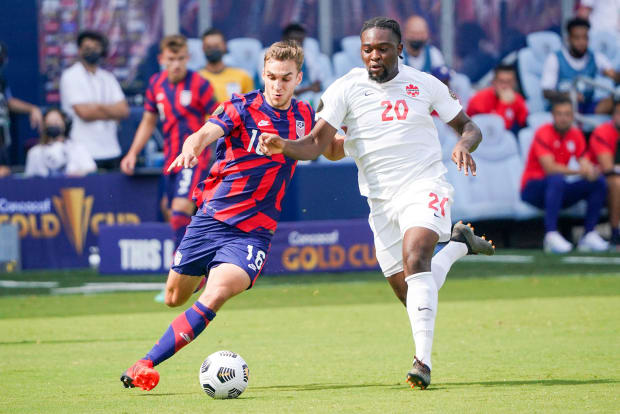The U.S. scored 20 seconds in vs. Canada and held on for the result that mattered, but beneath the surface there were some flaws that must be addressed.
The Concacaf Gold Cup’s group stage typically is a perfunctory procession lacking in tension or intrigue. But there was the U.S. men’s national team on a warm Sunday evening in Kansas City, Kan., facing some first-round stakes.
Three points against Canada would seal first place in the group (the visitors needed only a tie thanks to their goal differential advantage). More importantly, a U.S. win would theoretically mean a more forgiving draw in the tournament’s knockout rounds. That’s about as much pressure as you’re going to find at this stage of the biennial confederation championship. Toss in the budding rivalry between the northern neighbors, and this was an early Gold Cup game with more subplots than usual.
“There’ll be a bit of a final atmosphere in the match,” Canada coach John Herdman said before kickoff.
If there was, then both teams played to the occasion. They produced a tight and tense affair that was dominated for significant stretches by Canada but which the Americans won, 1–0, thanks to a historic goal by Shaq Moore. Both the U.S. (3-0-0) and Canada (2-1-0) will move on to next weekend’s quarterfinals.

U.S. coach Gregg Berhalter will have plenty to think about between now and then. His team struggled to impose itself, to hold the ball, to build possession out of the back and to bring the forwards into the game. The Canadians were dominant at times during the second stanza, and the Americans were fortunate it didn’t show up on the scoreboard. A couple U.S. errors went unpunished, and the referee denied a couple Canadian penalty appeals. The hosts survived with some desperate defending at the end and surely will have to be better in the knockout rounds.
"When you want something bad enough, and we wanted to win the group, you put out that type of effort," Berhalter said afterward as he focused on the positive. "Really, really proud of the effort of the guys. Having to go through injures and go through water breaks and go through physical play, I think they did a great job."
The U.S. entered sold-out Children’s Mercy Park (the crowd included Chiefs quarterback Patrick Mahomes) on a 12-game Concacaf win streak. The last regional defeat came to Canada, of all teams, in a Nations League match back in the fall of 2019. That loss was the clear low point of Berhalter’s tenure. It’s been a steady climb since. Canada, under Herdman, has been on the rise as well. Its program-record, eight-game win streak heading into Sunday included a 6-0-0 mark during the first two rounds of World Cup qualifying, which lifted Canada to the final phase for the first time since 1998.
“I think the resurgent teams in Concacaf are the United States and Canada,” Berhalter said Saturday.

Many of the players who have fueled that resurgence were unavailable in Kansas City. For the U.S., this is a ‘B’ team Gold Cup. Berhalter is resting almost all of the European-based stars who will anchor the squad in World Cup qualifying. For Canada, it’s a B+ tournament thanks to the absences of Bayern Munich’s Alphonso Davies (injured), Lille’s Jonathan David and Besiktas’s Atiba Hutchinson, among others.
Nevertheless, the opportunity to win a continental title and make a case for minutes in World Cup qualifying mattered plenty to those involved. And there are players on this U.S. squad whom fans have been curious to see. Several of them made starts on Sunday as Berhalter merged pieces of the lineups he used in the group-stage wins over Haiti and Martinique. Among the younger men getting a second look in Berhalter’s dynamic 3-5-2 were New York City FC defender James Sands; hometown favorite Gianluca Busio, a midfielder; and Orlando City striker Daryl Dike, who tallied twice against Martinique.
But it would be Moore, a wingback starting because of Reggie Cannon’s hamstring issue, who would lift the U.S. to first place. Seconds after kickoff, midfielder Kellyn Acosta won a duel and spotted Sebastian Lletget alone in the left channel. The LA Galaxy linchpin hit an inch-perfect cross toward the right post, where Moore, a 24-year-old Georgian who plays for Spanish Segunda team Tenerife, had beaten his mark. The finish was emphatic. Moore played well against Haiti in the Gold Cup opener and was involved in the game-winning play that day, and his goal after 20 seconds against Canada not only made the difference again, it was the earliest goal scored in the USMNT’s modern era.

But it was just about the only U.S. highlight. And it was its only shot on goal. Captain Walker Zimmerman exited with an injury in the 15th minute, and the insertion of the far-less-experienced Donovan Pines changed the complexion of the U.S. back line. By the middle of the first half, the midfield of Busio, Acosta and Lletget was starting to buckle. Duels were lost, turnovers were more prevalent and the runs and rhythm that marked the game’s opening 20-plus minutes gradually disappeared. Tajon Buchanan of the New England Revolution drove the Canadians forward, and in the second half, despite their own injury issues, the visitors carried the play.
"I think it was an amazing start to the game and then there was a lot of suffering. ... The guys persevered and showed amazing character and amazing effort under really difficult conditions in the heat and the opponent having the ball for large portions," Berhalter said. "In these type of conditions when you have the ball you need to keep the ball. When you don’t have the ball it's going to be difficult to get it back. It’s hard to bring the high intensity in weather like this, so you need intensity to win the ball back. … Second half, very rarely did we keep it and then we ended up defending."
A Pines turnover nearly led to a goal by Cyle Larin in the 46th minute, but Matt Turner made the save. Pines also was somewhat fortunate not to be whistled for a penalty after putting his hand on a falling Richie Laryea. Berhalter finally made a trio of needed changes in the 74th minute, bringing on two new midfielders and forward Matthew Hoppe, who was able to relieve some pressure with a couple of dribbling runs. Still, it was Buchanan who had the best chance late, curling a 79th-minute shot just wide of the right post.
Canada held 54.5% of possession and outshot the U.S. 14-6. Herdman was left feeling frustrated.

“It’s hard,” he said. “It’s a valiant effort and there’s a bit of pride in there. But at the same time, we’ve got to win these games. It was a good learning [experience] for us.”
And it left Berhalter impressed.
"Under these conditions, you get stressed. Your decision making is affected," he said. "I think sometimes this was a group that hasn’t played together. You look at Canada, they’ve been together for the last month—the same group. They’re very familiar with what they’re doing and it showed today. I give a lot of credit to the Canadian team as well."
The U.S., a six-time Gold Cup champion, and Canada (which won in 2000) could meet again in the Gold Cup final. They definitely will face off on Sept. 5 in a World Cup qualifier in Nashville. Meanwhile, the U.S. will play either Costa Rica or Jamaica in a July 25 Gold Cup quarterfinal outside Dallas (Canada will meet the other). The Americans’ motivation to win Sunday was to avoid a potential semifinal showdown with Mexico. El Tri narrowly defeated El Salvador later Sunday and, with the 1–0 win, topped its group. The expected first-place finishes for both the U.S. and Mexico mean they can't clash until the Aug. 1 title game in Las Vegas.
"We wanted to win the group and we won the group," Berhalter concluded. "They had to come in to the game only needing a tie, and they didn’t get it. So for us, we’re happy."
More Gold Cup Coverage: